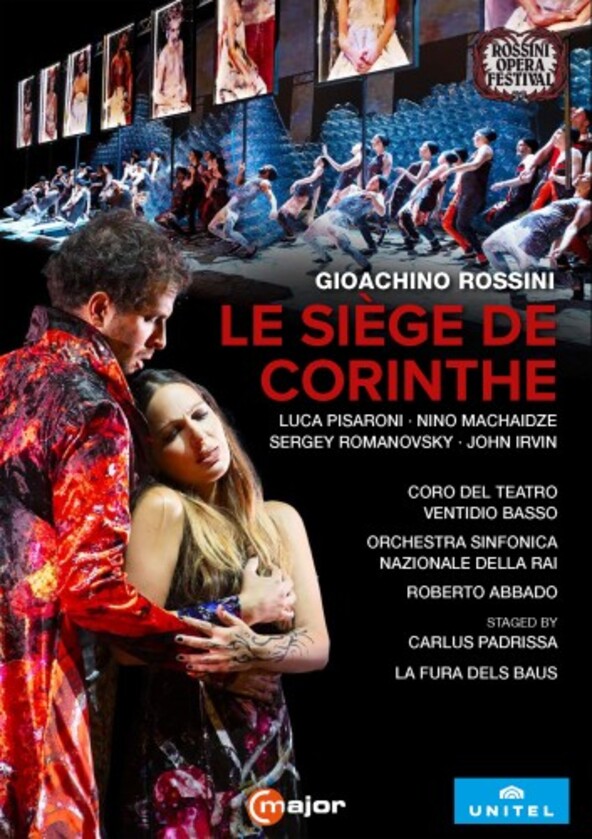ROSSINI Le Siège de Corinthe (Abbado)
View record and artist detailsRecord and Artist Details
Genre:
Opera
Label: C Major
Magazine Review Date: 05/2024
Media Format: CD or Download
Media Runtime: 173
Mastering:
DDD
Catalogue Number: 765808

Tracks:
| Composition | Artist Credit |
|---|---|
| (Le) Siège de Corinthe, 'Assedio di Corinto' |
Gioachino Rossini, Composer
Carlo Cigni, Hiéros, Bass Cecilia Molinari, Ismène, Mezzo soprano Chorus of the Teatro Ventidio Basso Iurii Samoilov, Omar, Baritone John Irvin, Cléomène, Tenor Luca Pisaroni, Mahomet II, Bass-baritone Nino Machaidze, Pamyra, Soprano Orchestra Sinfonica Nazionale della RAI Roberto Abbado, Conductor Sergey Romanovsky, Néoclès, Tenor Xabier Anduaga, Adastre, Tenor |
Author: Richard Osborne
Rossini’s Le siège de Corinthe, written for the Paris Opéra in 1826, was a game-changer in the history of opera. It’s one of Rossini’s most memorable achievements; yet it’s also one of his unluckiest.
The first of two politically charged music dramas adapted from Neapolitan originals, Le siège is a remake of Rossini’s penultimate Naples opera Maometto II, a revolutionary work set at the time of the Turkish sack of Negroponte in 1476. With the location changed to Corinth, the French rewrite offered a searing parallel to the horrors currently being visited on the people of Missolonghi by the Ottoman Turks at the height of the Greek War of Independence. The impact was huge, as it would be today should any opera company be bold enough to stage Le siège in the shadow of Israel’s assault on Gaza.
After Greece won its independence in 1832, the opera took on a new lease of life in Italy, whose own wars of independence were just beginning. Rossini had nothing to do with the clumsily translated L’assedio di Corinto, nor with any of the numerous adaptations – mostly designed to boost the status of star singers.
We had an example of this in a spectacular recording of L’assedio di Corinto, made under the musical and editorial direction of Thomas Schippers in 1975 (EMI, 6/76). Beverly Sills starred as the doomed heroine Pamira, the part lavishly rewritten as a coloratura showpiece, while the role of the ardent young Greek officer Neocle was sung en travesti by mezzo-soprano Shirley Verrett. This would have been right for Maometto II, but in another epoch-changing act, Rossini had recast the role of Néoclès for a lyric tenor, the 24-year-old Adolphe Nourrit. The Schippers set was rightly lambasted by scholars, but listening to it in the CD transfer Warner Classics made for its Rossini Edition (12/18), I wondered at the sheer intensity of a performance recorded in an age when opera clearly mattered.
As it happens, the star of this new 2017 Pesaro Festival production is the Russian tenor Sergey Romanovsky, who’s quite outstanding. There are also distinguished performances from Nino Machaidze as Pamyra and tenor John Irvin as Pamyra’s father Cléomène. The text is also good, based on the long-awaited Critical Edition by Damien Colas.
Had the festival chosen to release the performance on CD, it might have challenged the superb 2010 Rossini in Wildbad account, featuring rising star Michael Spyres as Néoclès and Majella Cullagh as Pamyra, which Naxos released in 2013. (Happily, the two-CD set, unnoticed by Gramophone at the time, remains in the Naxos catalogue.)
If the new Pesaro Festival DVD is impossible to recommend, it’s because of an abysmal production – ill-lit and poorly filmed – made amid the wastes of Pesaro’s 10,000-seat multipurpose sports arena into which the festival inserts its own opera stage and pit. Opera’s Hugh Canning described the production as ‘a bog-standard park-and-bark staging’. Actually, it’s not even bog-standard, given the bizarre nature of director Carlus Padrissa’s own designs. Built out of hundreds of transparent plastic water-cooler bottles, they’re a travesty of a mise en scène which, in Paris in 1826, opened up a historically important new world of realistic stage design.
In 2000 the festival entrusted Le siège to actor and cinema director Massimo Castri, who argued that Rossini’s take on the story (which ends with an onstage holocaust) was ironic. It was judged the worst production in the festival’s then 20-year history. This 2017 production – tautly conducted by Roberto Abbado, despite his conducting arm being in a sling – is better cast and has a better text, but the staging is equally inept. An unlucky opera? You can say that again.
Explore the world’s largest classical music catalogue on Apple Music Classical.
Included with an Apple Music subscription. Download now.

Gramophone Digital Club
- Digital Edition
- Digital Archive
- Reviews Database
- Events & Offers
From £9.20 / month
Subscribe
Gramophone Club
- Print Edition
- Digital Edition
- Digital Archive
- Reviews Database
- Events & Offers
From £11.45 / month
Subscribe
If you are a library, university or other organisation that would be interested in an institutional subscription to Gramophone please click here for further information.






